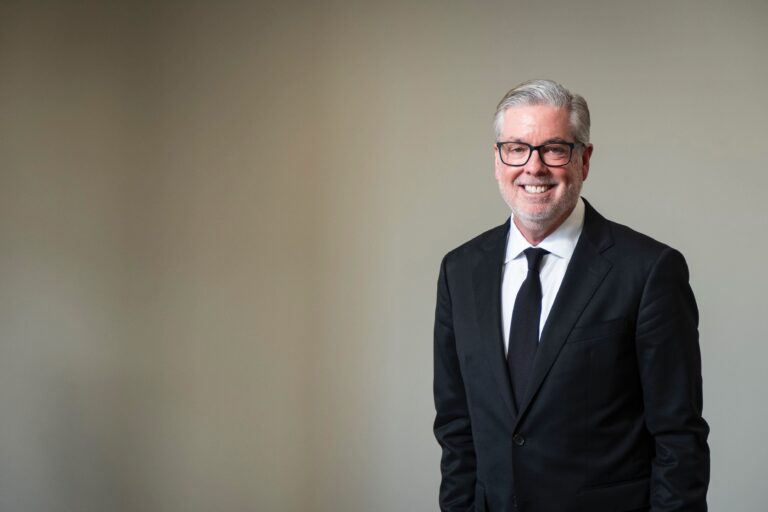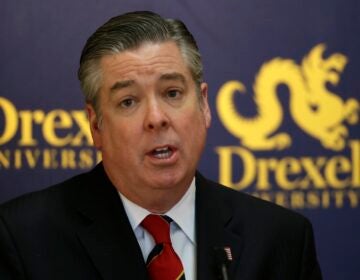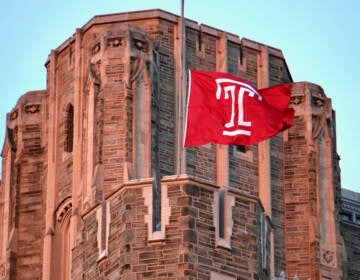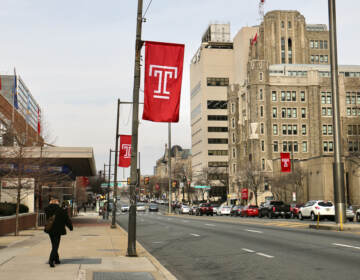John Fry will be Temple’s next president. Here are 6 things to know
Fry explained his vision for tackling crime on campus, increasing diversity, and working with the neighboring community.
Listen 1:07
John Fry, named 15th President at Temple University on July 3, 2024, discusses his vision for school. (Courtesy of Temple University)
From Philly and the Pa. suburbs to South Jersey and Delaware, what would you like WHYY News to cover? Let us know!
John Fry has been named the next President of Temple University. Fry, who is currently the president of Drexel University, spoke with WHYY News about the switch from one of Philadelphia’s top institutions of higher learning to another.
Here are six takeaways from that interview.
Why did Fry choose to leave Drexel to join Temple’s leadership?
Fry said that Temple and Drexel share similarities, but Temple has some differences from his current university. ”Temple is such like Drexel, it is such a compelling institution but a really different institution. Temple is public with a large health system and in a different part of the city. But really compelling in terms of its history, its incredibly powerful mission focused on first-gen[eration] students and underrepresented populations,” Fry said.
Fry plans to utilize that diversity and the school’s location for more opportunities for all. “All this amazing research capacity that it has, which I think can lead to significant commercialization, which could also hopefully lead to some really interesting growth like in the North Philadelphia Innovation Corridor, which I know that with projects like iNest, they’ve been working on for a while,” said Fry.
The Innovation Nest, aptly nicknamed the iNest, officially opened its doors on March 19. It is a one-stop shop for startup companies, aspiring Temple researchers and student innovators to commercialize new innovations.
Temple University is a public school located in North Philly and had 30,530 students enrolled last year. Drexel University is a private school located in West Philly and had 23,217 enrollment during the 2022-2023 school year.
In Fall 2022, the Temple student population was made up of 51% Students of Color, and 63% of their student body were Pennsylvania residents.
Affirmative Action and the future of a more diverse student population
In an historic decision, the U.S. Supreme Court effectively ended race-conscious admission programs at colleges and universities across the country. This change left some higher institutions struggling to find legal ways to ensure diversity on campus. According to the latest Pew State of the City report, Black people represent the largest racial demographic in Philadelphia at 38.6% of residents.
Temple reports its institution enrolled the most ethnically and geographically diverse class of students in at least a quarter of a century. According to their data research, Temple reports that 45% of the Class of 2025 are students of color. This past academic year, out of the 30,530 total students, 4,707 were African American, representing 15.4% of the student body.
Fry would not comment on the Supreme Court’s decision regarding affirmative action, but he did share that he wants to continue the legacy of diversity on campus.
“Given the way the law is shaped, doing everything we can to continue that push, and really building on the substantial strengths. I think Temple has already made, and we’ve made good progress, but it’s a never-ending thing. So I would, I would just continue to emphasize diversity as a core pillar. And [a] differentiator and opportunity at Temple,” said Fry.
Fry said he supports programs that provide more students and staff of color opportunities, “That is part of Temple heritage, and you know access, you know, for all and an emphasis on a diverse student body and a diverse employee base.”
Climate sustainability
When it comes to a “sustainable economy” or a “sustainable energy system” on campus Fry doesn’t have a plan for Temple yet, but mentioned Drexel has worked to improve the sustainability on their campus. He said he would look at similar options.
“So much of this has happened quickly that I really haven’t had a chance to dig into sustainability practices. You know we have it, we have something called the Environmental Collaboratory at Drexel, which is a large multidisciplinary sort of Hub for faculty and students, both academically, but also civically, to sort of practice more sustainable practices at the university and also to do so in the context of both teaching and research. People are talking about these issues and then people are acting on those issues. So I would hope that there are plenty of opportunities for that kind of convening and that kind of action at Temple,” Fry said.
What next for the North Philly Community?
Temple University is located in North Philadelphia and surrounded by homes and residents who will be impacted by many decisions the university makes. Fry said he hopes to meet with community leaders and plans to collaborate to ensure they can voice their opinions and utilize the resources and opportunities available at the school. Fry said Temple will continue to play a vital role in the local community and economy.
“It’s a great anchor institution that means so much to neighbors, who are living, you know, in the areas surrounding Temple and the anchor mission is something in particular that really resonates with me. I’ve tried during my years at Drexel to make sure that it fulfills all the promise that a great anchor institution would. And I know the Temple has that same capacity,” Fry said.
How Fry plans to tackle crime and violence on campus and in the community
Crime has plagued the campus over the recent years, and in March of 2023, Temple’s first Black president, Jason Wingard, resigned after a tumultuous tenure of less than two years. His resignation was fueled by student protests over the surge of violence and safety concerns that affected the North Philadelphia campus.
Fry said he supports former Philadelphia Police Commissioner Charles H. Ramsey, whose firm 21CP was commissioned by Temple to do a comprehensive study on campus and neighborhood safety.
“So for example, he had recommended a camera dashboard to show everyone in a very transparent way, you know what’s going on. So there’s no hidden information that people are able to understand what’s happening on their campus and in their neighborhoods. And Ramsey has held that up a sort of national example of transparency and engagement,” said Fry.
“So I know that the temple team is hard at work in implementing those. My job will be to make sure that they have the resources and the support you know to do so, and I think we just literally follow that playbook and also continue to invest in the very brave people who are our police force and our security team and make sure that they know they have our backing fully, and so I’m really looking forward to being sort of engaged in that work but I know it’s already seriously underway and making really meaningful progress.”
The future of an affordable college
The average tuition and fees at public schools rose 2% for in-state students and about 1.4% for out-of-state students according to the U.S. News and World Report’s annual survey last year. Temple tuition varies with their annual rate for in-state students, beginning at $17,976, and base tuition for out-of-state students is as high as $32,376.
Fry wants to keep Temple affordable for incoming and returning students, “I think there’s two things. There is very disciplined cost management. So the institution is just only doing the things that are absolutely required to deliver, you know, a first-class education and making sure that expenses are really managed tightly. Number two would be philanthropy … scholarship funding, would be a major, major emphasis,” Fry said.
This spring, the school announced a new three-year Temple scholarship initiative aimed to raise $125 million to support students through their Made for More: Prioritizing Scholarships at Temple, program. The university aims to make a Temple education more affordable for current and future students and raise awareness about the importance of scholarship giving.
“From what I’ve read, the Temple Promise is an amazing program. It’s one of those things when you see other institutions do that kind of thing, you know, like hats off. Anything that gives people more access in a more affordable way and also really creates the environment where they can graduate in four years, so they’re not delaying their time, into the workplace or for further studies is something that I really support,” Fry said.
Fry also supports the Temple Promise program, allowing full-time students from low-income families living within Philadelphia County to attend for free.
Fry assumes his tenure at Temple once new leadership is named at Drexel.
Fry will succeed interim President Richard Englert, who has served the Temple community for 48 years.

Get daily updates from WHYY News!
WHYY is your source for fact-based, in-depth journalism and information. As a nonprofit organization, we rely on financial support from readers like you. Please give today.






